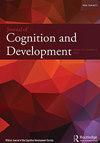Children’s Emerging Understanding of Anonymity Does Not Predict Reputation Enhancing Generosity
IF 2.1
2区 心理学
Q3 PSYCHOLOGY, DEVELOPMENTAL
引用次数: 0
Abstract
ABSTRACT Young children tend to behave more generously when their actions are identified than when they are anonymous, yet we know little about the cognitive foundations required for anonymity to impact generosity. In three studies we examined Canadian children’s understanding of anonymity and its impact on sharing in anonymous and identified contexts. Study 1 assessed whether 3- and 5-year-old children (N = 100, 51 female) understood anonymous and identified sharing, and whether age-related changes in their understanding corresponded to sharing behavior. We found that understanding of anonymity improved with age, but anonymity did not influence sharing. Study 2 assessed 5-year-old children’s (N = 60, 30 female) judgments about how others would share in these contexts and their preferences for receiving donations from identified or anonymous donors. We found that children preferred to receive from identified donors and believed that identified donors were more generous. Study 3 assessed whether 5-year-old children (N = 60, 30 female) preferred to share as anonymous or identified donors themselves, and whether their choice influenced sharing behavior. We found that while participants preferred to share as identified donors, this choice did not influence sharing. Overall, our findings suggest that although 5-year-old Canadian children have a robust understanding of the implications of anonymous and identified sharing, this understanding is not sufficient to motivate increased generosity.儿童对匿名的初步理解并不能预测声誉会增强慷慨
本文章由计算机程序翻译,如有差异,请以英文原文为准。
求助全文
约1分钟内获得全文
求助全文
来源期刊

Journal of Cognition and Development
Multiple-
CiteScore
4.00
自引率
0.00%
发文量
29
期刊介绍:
The Journal of Cognition and Development is the official journal of the Cognitive Development Society (CDS). Some CDS members are concerned with basic research or theory; others focus on policy issues and practical applications. The range of interests includes cognitive development during all stages of life, and we seek to understand ontogenetic processes in both humans and nonhumans. Finally, their interests encompass typical as well as atypical development, and we attempt to characterize both biological and cultural influences on cognitive change and continuity.
 求助内容:
求助内容: 应助结果提醒方式:
应助结果提醒方式:


